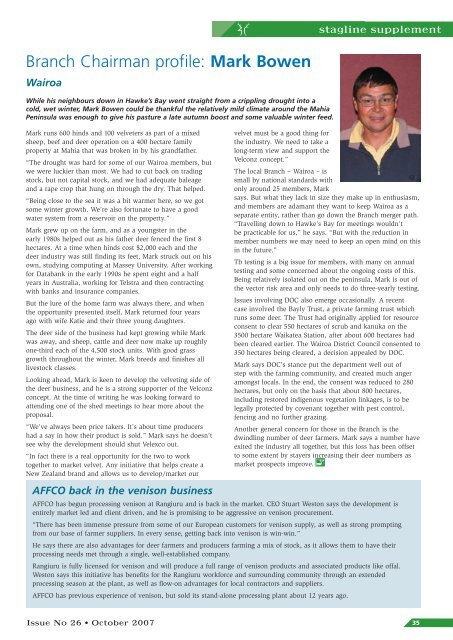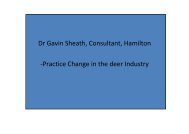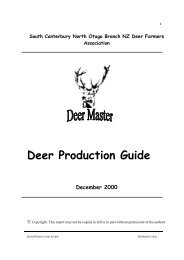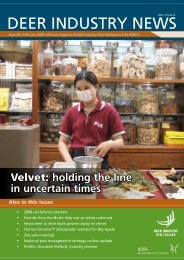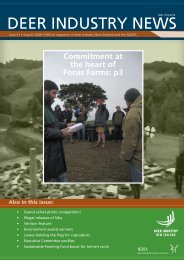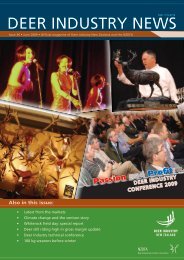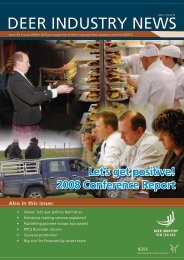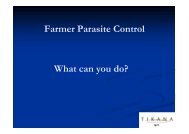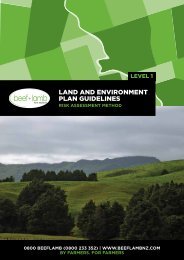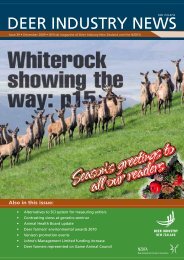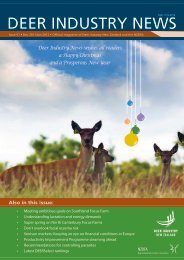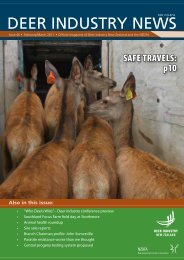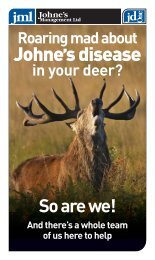Deer Industry News #26 October 2008 - Deer Industry New Zealand
Deer Industry News #26 October 2008 - Deer Industry New Zealand
Deer Industry News #26 October 2008 - Deer Industry New Zealand
You also want an ePaper? Increase the reach of your titles
YUMPU automatically turns print PDFs into web optimized ePapers that Google loves.
stagline supplement<br />
Branch Chairman profile: Mark Bowen<br />
Wairoa<br />
While his neighbours down in Hawke’s Bay went straight from a crippling drought into a<br />
cold, wet winter, Mark Bowen could be thankful the relatively mild climate around the Mahia<br />
Peninsula was enough to give his pasture a late autumn boost and some valuable winter feed.<br />
Mark runs 600 hinds and 100 velveters as part of a mixed<br />
sheep, beef and deer operation on a 400 hectare family<br />
property at Mahia that was broken in by his grandfather.<br />
“The drought was hard for some of our Wairoa members, but<br />
we were luckier than most. We had to cut back on trading<br />
stock, but not capital stock, and we had adequate baleage<br />
and a rape crop that hung on through the dry. That helped.<br />
“Being close to the sea it was a bit warmer here, so we got<br />
some winter growth. We’re also fortunate to have a good<br />
water system from a reservoir on the property.”<br />
Mark grew up on the farm, and as a youngster in the<br />
early 1980s helped out as his father deer fenced the first 8<br />
hectares. At a time when hinds cost $2,000 each and the<br />
deer industry was still finding its feet, Mark struck out on his<br />
own, studying computing at Massey University. After working<br />
for Databank in the early 1990s he spent eight and a half<br />
years in Australia, working for Telstra and then contracting<br />
with banks and insurance companies.<br />
But the lure of the home farm was always there, and when<br />
the opportunity presented itself, Mark returned four years<br />
ago with wife Katie and their three young daughters.<br />
The deer side of the business had kept growing while Mark<br />
was away, and sheep, cattle and deer now make up roughly<br />
one-third each of the 4,500 stock units. With good grass<br />
growth throughout the winter, Mark breeds and finishes all<br />
livestock classes.<br />
Looking ahead, Mark is keen to develop the velveting side of<br />
the deer business, and he is a strong supporter of the Velconz<br />
concept. At the time of writing he was looking forward to<br />
attending one of the shed meetings to hear more about the<br />
proposal.<br />
“We’ve always been price takers. It’s about time producers<br />
had a say in how their product is sold.” Mark says he doesn’t<br />
see why the development should shut Velexco out.<br />
“In fact there is a real opportunity for the two to work<br />
together to market velvet. Any initiative that helps create a<br />
<strong>New</strong> <strong>Zealand</strong> brand and allows us to develop/market our<br />
AFFCO back in the venison business<br />
velvet must be a good thing for<br />
the industry. We need to take a<br />
long-term view and support the<br />
Velconz concept.”<br />
The local Branch – Wairoa – is<br />
small by national standards with<br />
only around 25 members, Mark<br />
says. But what they lack in size they make up in enthusiasm,<br />
and members are adamant they want to keep Wairoa as a<br />
separate entity, rather than go down the Branch merger path.<br />
“Travelling down to Hawke’s Bay for meetings wouldn’t<br />
be practicable for us,” he says. “But with the reduction in<br />
member numbers we may need to keep an open mind on this<br />
in the future.”<br />
Tb testing is a big issue for members, with many on annual<br />
testing and some concerned about the ongoing costs of this.<br />
Being relatively isolated out on the peninsula, Mark is out of<br />
the vector risk area and only needs to do three-yearly testing.<br />
Issues involving DOC also emerge occasionally. A recent<br />
case involved the Bayly Trust, a private farming trust which<br />
runs some deer. The Trust had originally applied for resource<br />
consent to clear 550 hectares of scrub and kanuka on the<br />
3500 hectare Waikatea Station, after about 600 hectares had<br />
been cleared earlier. The Wairoa District Council consented to<br />
350 hectares being cleared, a decision appealed by DOC.<br />
Mark says DOC’s stance put the department well out of<br />
step with the farming community, and created much anger<br />
amongst locals. In the end, the consent was reduced to 280<br />
hectares, but only on the basis that about 800 hectares,<br />
including restored indigenous vegetation linkages, is to be<br />
legally protected by covenant together with pest control,<br />
fencing and no further grazing.<br />
Another general concern for those in the Branch is the<br />
dwindling number of deer farmers. Mark says a number have<br />
exited the industry all together, but this loss has been offset<br />
to some extent by stayers increasing their deer numbers as<br />
market prospects improve.<br />
AFFCO has begun processing venison at Rangiuru and is back in the market. CEO Stuart Weston says the development is<br />
entirely market led and client driven, and he is promising to be aggressive on venison procurement.<br />
“There has been immense pressure from some of our European customers for venison supply, as well as strong prompting<br />
from our base of farmer suppliers. In every sense, getting back into venison is win-win.”<br />
He says there are also advantages for deer farmers and producers farming a mix of stock, as it allows them to have their<br />
processing needs met through a single, well-established company.<br />
Rangiuru is fully licensed for venison and will produce a full range of venison products and associated products like offal.<br />
Weston says this initiative has benefits for the Rangiuru workforce and surrounding community through an extended<br />
processing season at the plant, as well as flow-on advantages for local contractors and suppliers.<br />
AFFCO has previous experience of venison, but sold its stand-alone processing plant about 12 years ago.<br />
Issue No 26 • <strong>October</strong> 2007 35


